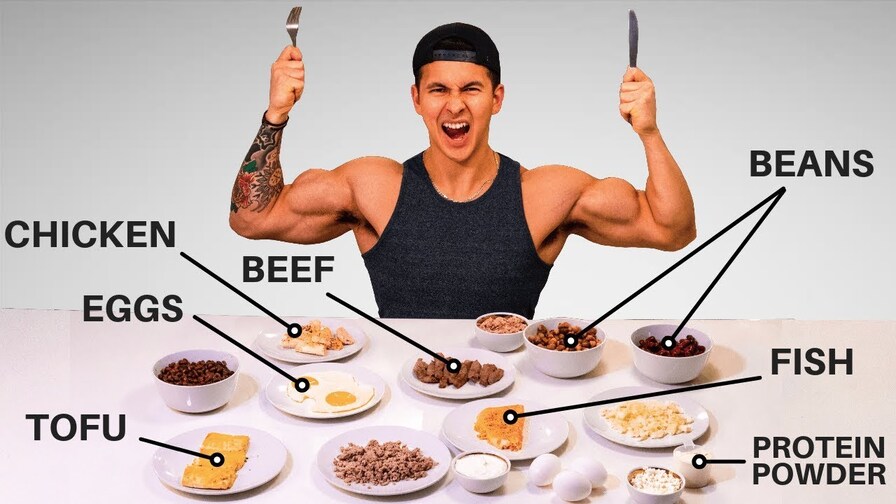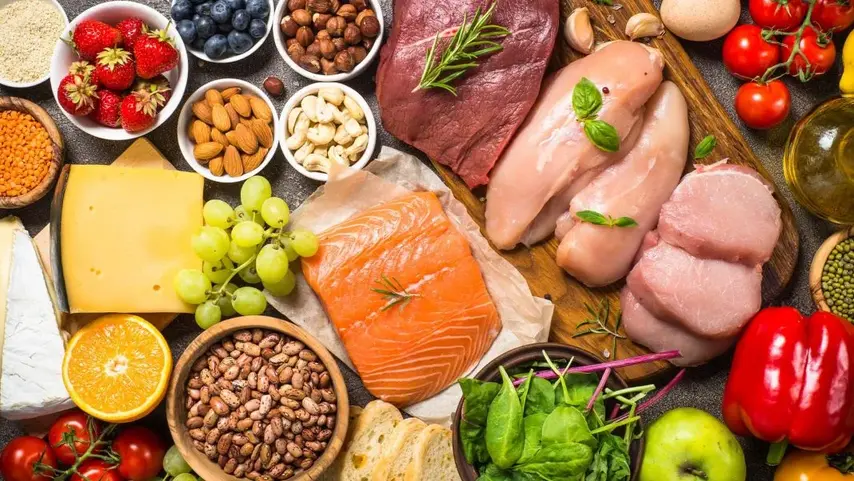Building muscle is a goal shared by many, whether you’re a seasoned athlete, a gym enthusiast, or someone looking to improve overall health and fitness. While there are various factors involved in muscle growth, protein stands out as a key player. But how exactly does eating protein help you build muscle? Let’s dive into the science behind it, exploring the crucial role of protein in muscle development and the best ways to optimize your protein intake for maximum gains.
What Is Protein and Why Is It Important?
Protein is a macronutrient, one of the three essential nutrients that your body needs to function properly, alongside carbohydrates and fats. But what makes protein so special when it comes to muscle building?
Protein: The Building Block of Muscle
- Amino Acids: Proteins are made up of smaller units called amino acids, often referred to as the building blocks of life. There are 20 different amino acids, nine of which are essential, meaning your body cannot produce them, so they must be obtained from your diet.
- Muscle Protein Synthesis (MPS): When you consume protein, your body breaks it down into these amino acids, which are then used for various functions, including the repair and growth of muscle tissue. This process is known as Muscle Protein Synthesis (MPS).
- Muscle Maintenance: Without adequate protein, your body may not have the necessary resources to repair and maintain muscle tissue, leading to muscle loss over time, especially if you’re engaging in regular physical activity.
How Does Protein Contribute to Muscle Growth?
Muscle growth, or hypertrophy, occurs when the rate of muscle protein synthesis exceeds the rate of muscle protein breakdown. Here’s how protein intake plays a pivotal role in this process:
1. Stimulating Muscle Protein Synthesis
- Post-Workout Recovery: After intense exercise, particularly resistance training, your muscles undergo microtears. Consuming protein after your workout provides the amino acids needed to repair these tears, resulting in stronger, larger muscles.
- Leucine: The Trigger for MPS: Among the amino acids, leucine is especially crucial for stimulating muscle protein synthesis. It acts as a trigger, signaling your body to start building and repairing muscle tissue.
2. Preventing Muscle Protein Breakdown
- Balanced Nitrogen Levels: Protein helps maintain a positive nitrogen balance in your body, which is essential for muscle growth. A negative nitrogen balance, where protein breakdown exceeds synthesis, can lead to muscle loss.
- Sustained Energy: Adequate protein intake ensures that your body has a steady supply of amino acids, preventing it from breaking down muscle tissue for energy, particularly during prolonged periods of exercise or calorie restriction.
3. Enhancing Strength and Performance
- Building Strength: Muscle strength is directly related to muscle size. By promoting muscle growth through protein consumption, you’re also enhancing your overall strength and physical performance.
- Endurance and Recovery: Protein also plays a role in muscle endurance and recovery, allowing you to train harder and more frequently, which further contributes to muscle development.
How Much Protein Do You Need for Muscle Growth?
Now that we understand the importance of protein in muscle building, the next question is: how much protein do you need to maximize your muscle gains?
1. Recommended Daily Intake
- General Guidelines: For most people, the general recommendation is to consume between 1.2 to 2.2 grams of protein per kilogram of body weight per day, depending on your activity level and fitness goals.
- Athletes and Bodybuilders: Those who are more active or looking to build significant muscle mass may require closer to 2.2 grams of protein per kilogram of body weight.
2. Timing Your Protein Intake
- Post-Workout Window: Consuming protein within the first 30 minutes to 2 hours after your workout is crucial for maximizing muscle protein synthesis. This period is often referred to as the “anabolic window.”
- Spread Throughout the Day: Rather than consuming all your protein in one meal, it’s more effective to distribute it evenly across your meals. Aim for 20-30 grams of protein per meal to stimulate MPS multiple times throughout the day.
3. Protein Quality Matters
- Complete Proteins: Focus on consuming complete proteins, which contain all nine essential amino acids. Animal-based sources like meat, eggs, and dairy are excellent options.
- Plant-Based Proteins: If you follow a plant-based diet, combine different protein sources, such as beans and rice, to ensure you get all essential amino acids.
Best Sources of Protein for Muscle Building
Not all proteins are created equal. Here are some of the best sources of protein to include in your diet for optimal muscle growth:
1. Animal-Based Proteins
- Lean Meats: Chicken breast, turkey, and lean cuts of beef are rich in protein and low in fat, making them ideal for muscle building.
- Fish and Seafood: Salmon, tuna, and other fatty fish provide not only high-quality protein but also essential omega-3 fatty acids that support muscle recovery.
- Eggs: Eggs are a powerhouse of nutrition, offering a complete protein source along with important vitamins and minerals.
- Dairy Products: Greek yogurt, cottage cheese, and milk are excellent sources of protein and calcium, which is crucial for muscle function.
2. Plant-Based Proteins
- Legumes: Beans, lentils, and chickpeas are rich in protein and fiber, making them a great addition to a muscle-building diet.
- Quinoa: Quinoa is one of the few plant-based foods that is a complete protein, providing all essential amino acids.
- Tofu and Tempeh: These soy-based products are versatile and packed with protein, making them popular choices among vegetarians and vegans.
- Nuts and Seeds: Almonds, chia seeds, and hemp seeds offer a combination of protein and healthy fats, supporting muscle growth and overall health.
Common Myths About Protein and Muscle Building
With so much information out there, it’s easy to get confused by myths and misconceptions. Let’s debunk some of the most common myths about protein and muscle building:
1. More Protein Equals More Muscle
- Myth: Consuming excessive amounts of protein will automatically lead to bigger muscles.
- Reality: Your body can only utilize a certain amount of protein for muscle building. Beyond that, extra protein is either used for energy or stored as fat.
2. Protein Shakes Are Essential
- Myth: You need to drink protein shakes to build muscle.
- Reality: While protein shakes can be convenient, they’re not a necessity. You can get all the protein you need from whole foods.
3. Plant-Based Proteins Are Inferior
- Myth: Plant-based proteins aren’t as effective as animal-based proteins for muscle growth.
- Reality: With the right combinations and adequate intake, plant-based proteins can be just as effective in supporting muscle growth.
Optimizing Your Diet for Muscle Growth
To maximize muscle growth, it’s important to not only focus on protein but also consider other aspects of your diet:
1. Balanced Nutrition
- Carbohydrates: Carbs provide the energy needed for intense workouts. Include complex carbs like whole grains, fruits, and vegetables in your diet.
- Healthy Fats: Fats are essential for hormone production, including testosterone, which plays a key role in muscle growth. Opt for sources like avocados, nuts, and olive oil.
2. Hydration
- Water: Staying hydrated is crucial for muscle function and recovery. Aim to drink at least 8-10 glasses of water per day, and more if you’re exercising intensely.
3. Consistency and Patience
- Long-Term Commitment: Building muscle takes time and consistent effort. Stick to a balanced diet and regular workout routine to see the best results.
- Rest and Recovery: Don’t underestimate the importance of rest. Muscles grow during recovery, so ensure you’re getting enough sleep and rest days between workouts.
In a Nutshell
Protein is undeniably a cornerstone of muscle growth, playing a crucial role in muscle repair, maintenance, and development. By understanding how protein works, how much you need, and the best sources to include in your diet, you can optimize your muscle-building efforts and achieve your fitness goals. Remember, it’s not just about consuming more protein, but about incorporating it into a well-rounded, balanced diet that supports your overall health and fitness journey.
Whether you’re a beginner or a seasoned athlete, making protein a priority in your diet is key to building the strong, resilient muscles you desire. So, next time you sit down for a meal, think about how it’s fueling your body and helping you build the muscle you’ve worked so hard for. Happy lifting!




